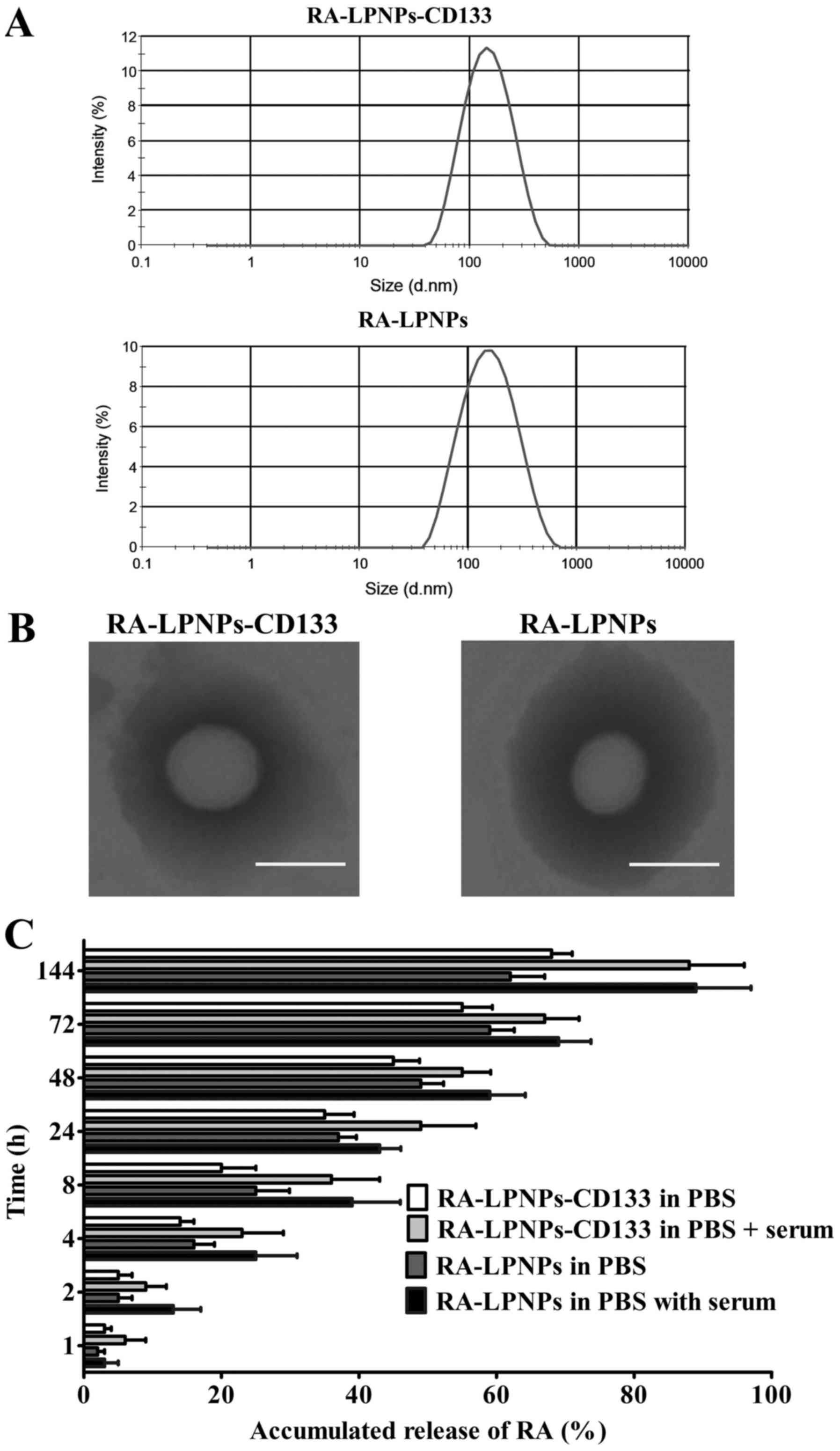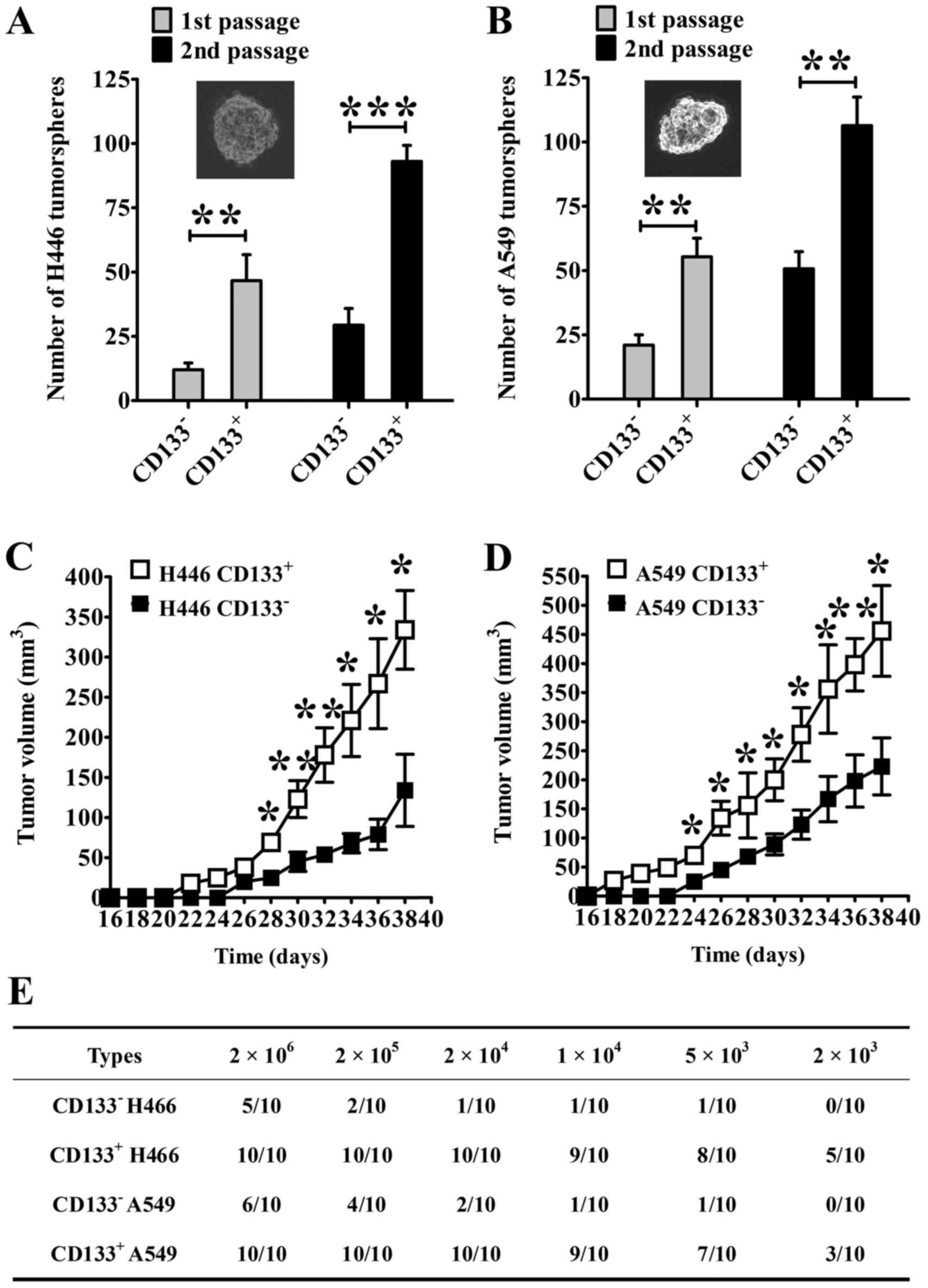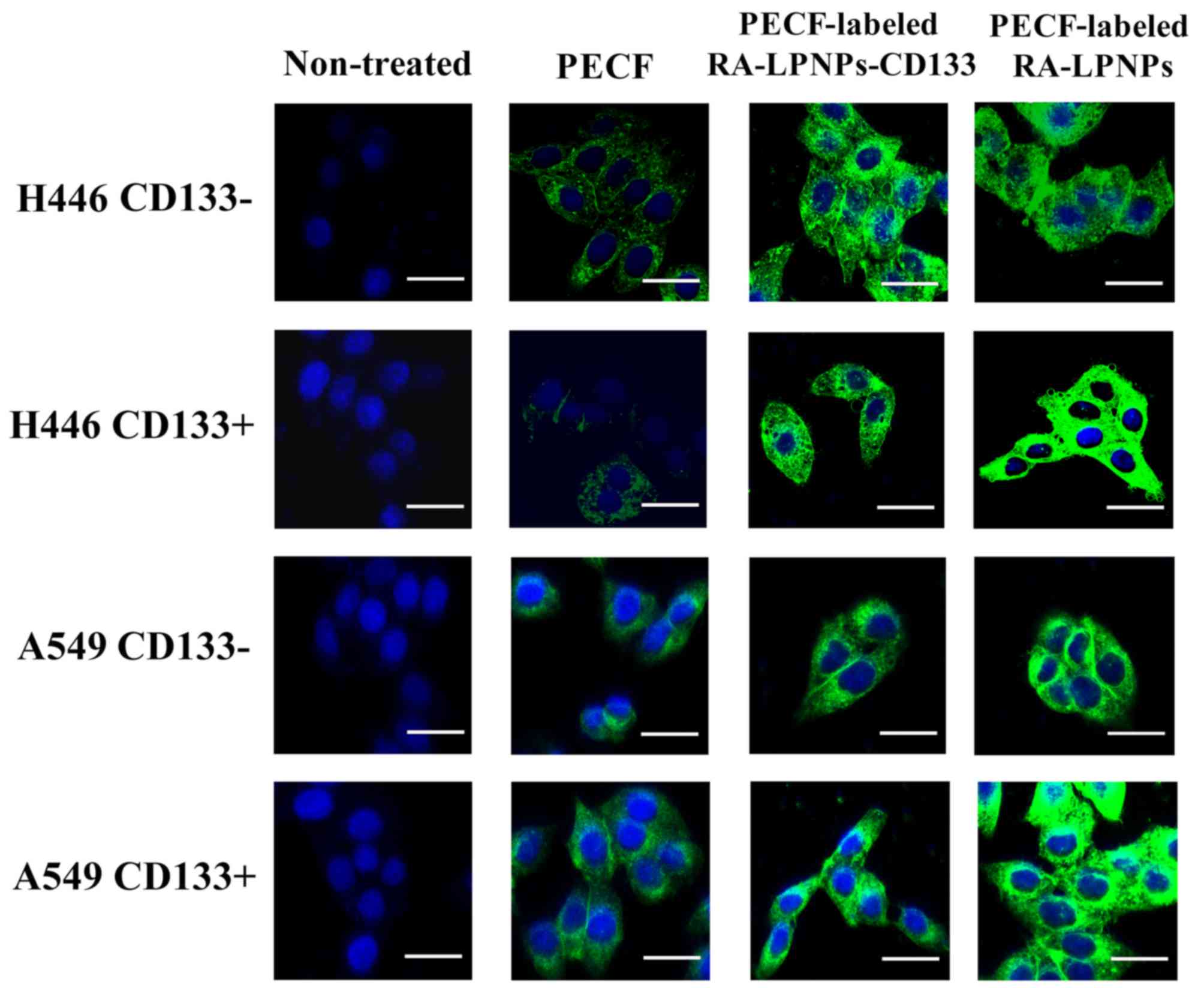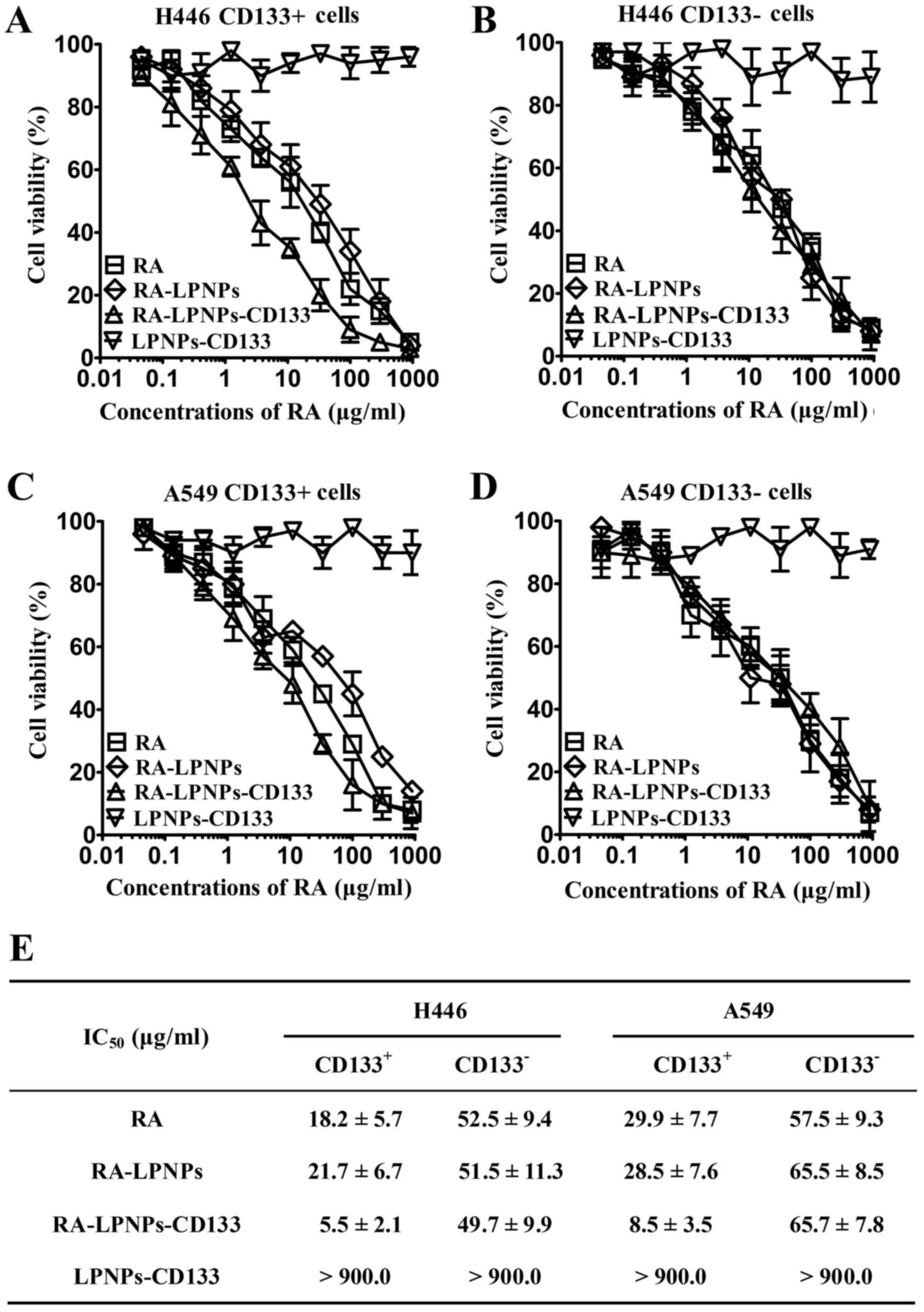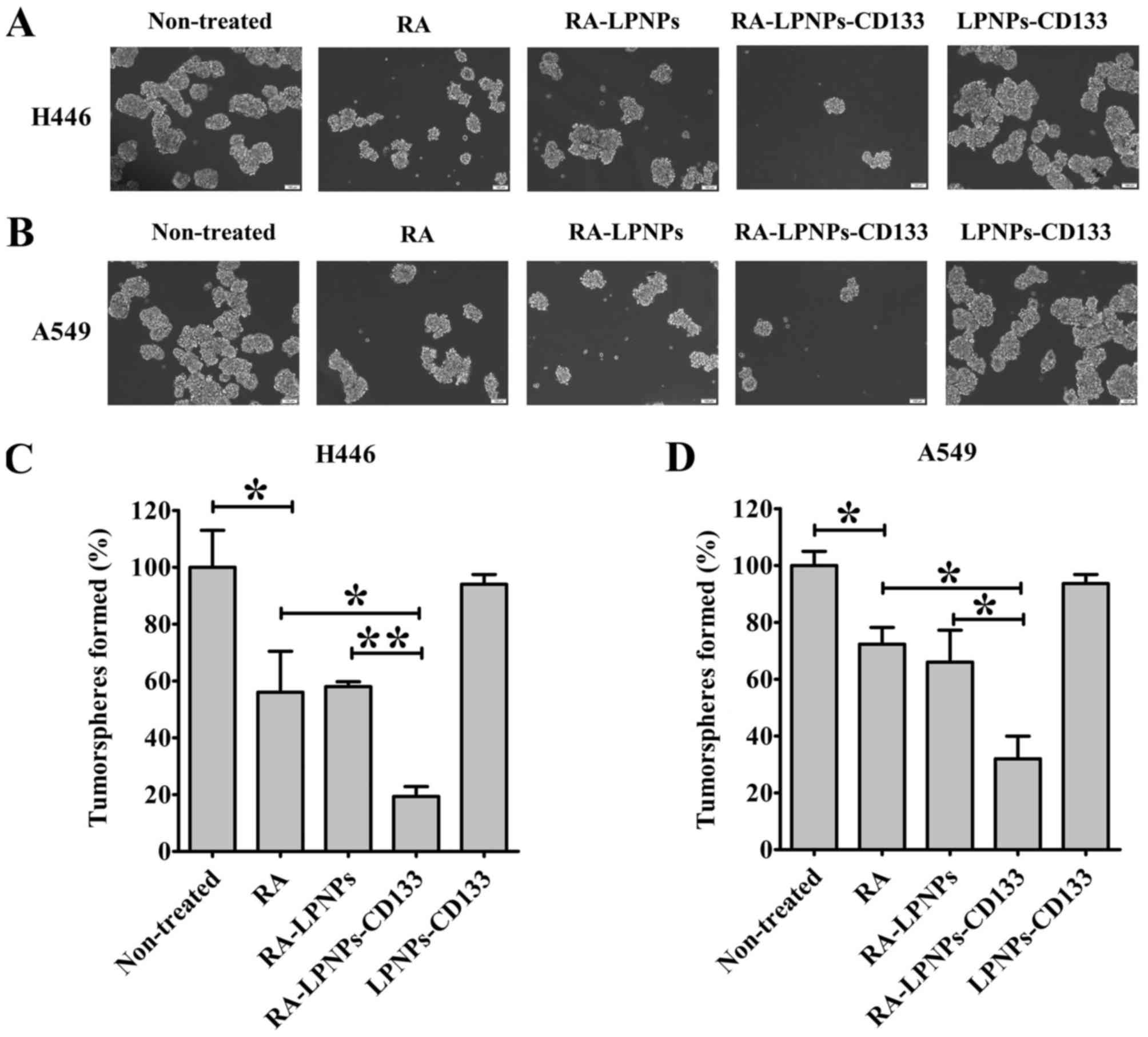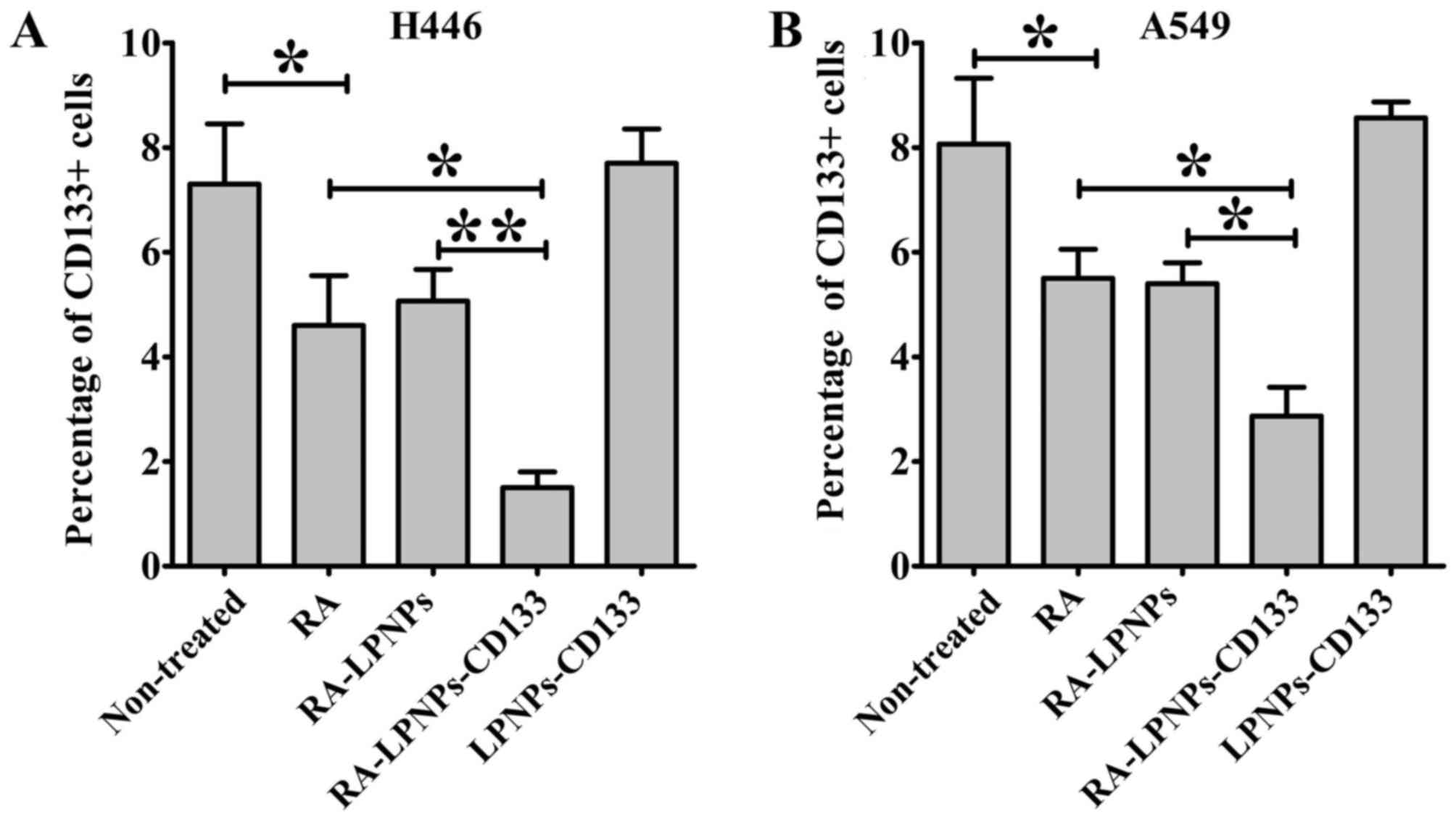|
1
|
Siegel RL, Miller KD and Jemal A: Cancer
statistics, 2017. CA Cancer J Clin. 67:7–30. 2017. View Article : Google Scholar : PubMed/NCBI
|
|
2
|
Chen W, Zheng R, Baade PD, Zhang S, Zeng
H, Bray F, Jemal A, Yu XQ and He J: Cancer statistics in China,
2015. CA Cancer J Clin. 66:115–132. 2016. View Article : Google Scholar : PubMed/NCBI
|
|
3
|
Eramo A, Lotti F, Sette G, Pilozzi E,
Biffoni M, Di Virgilio A, Conticello C, Ruco L, Peschle C and De
Maria R: Identification and expansion of the tumorigenic lung
cancer stem cell population. Cell Death Differ. 15:504–514. 2008.
View Article : Google Scholar : PubMed/NCBI
|
|
4
|
Kim JJ and Tannock IF: Repopulation of
cancer cells during therapy: An important cause of treatment
failure. Nat Rev Cancer. 5:516–525. 2005. View Article : Google Scholar : PubMed/NCBI
|
|
5
|
Zakaria N, Satar NA, Halim Abu NH, Ngalim
SH, Yusoff NM, Lin J and Yahaya BH: Targeting lung cancer stem
cells: Research and clinical impacts. Front Oncol. 7:802017.
View Article : Google Scholar : PubMed/NCBI
|
|
6
|
Bertolini G, Roz L, Perego P, Tortoreto M,
Fontanella E, Gatti L, Pratesi G, Fabbri A, Andriani F, Tinelli S,
et al: Highly tumorigenic lung cancer CD133+ cells display
stem-like features and are spared by cisplatin treatment. Proc Natl
Acad Sci USA. 106:16281–16286. 2009. View Article : Google Scholar : PubMed/NCBI
|
|
7
|
Siddikuzzaman Guruvayoorappan C and Berlin
Grace VM: All trans retinoic acid and cancer. Immunopharmacol
Immunotoxicol. 33:241–249. 2011. View Article : Google Scholar : PubMed/NCBI
|
|
8
|
Montesinos P, Bergua JM, Vellenga E, Rayón
C, Parody R, de la Serna J, León A, Esteve J, Milone G, Debén G, et
al: Differentiation syndrome in patients with acute promyelocytic
leukemia treated with all-trans retinoic acid and anthracycline
chemotherapy: Characteristics, outcome, and prognostic factors.
Blood. 113:775–783. 2009. View Article : Google Scholar : PubMed/NCBI
|
|
9
|
Li RJ, Ying X, Zhang Y, Ju RJ, Wang XX,
Yao HJ, Men Y, Tian W, Yu Y, Zhang L, et al: All-trans retinoic
acid stealth liposomes prevent the relapse of breast cancer arising
from the cancer stem cells. J Control Release. 149:281–291. 2011.
View Article : Google Scholar : PubMed/NCBI
|
|
10
|
Karsy M, Albert L, Tobias ME, Murali R and
Jhanwar-Uniyal M: All-trans retinoic acid modulates cancer stem
cells of glioblastoma multiforme in an MAPK-dependent manner.
Anticancer Res. 30:4915–4920. 2010.PubMed/NCBI
|
|
11
|
Han D, Rodriguez-Bravo V, Charytonowicz E,
Demicco E, Domingo-Domenech J, Maki RG and Cordon-Cardo C:
Targeting sarcoma tumor-initiating cells through differentiation
therapy. Stem Cell Res. 21:117–123. 2017. View Article : Google Scholar : PubMed/NCBI
|
|
12
|
Li B, Gao MH, Chu XM, Teng L, Lv CY, Yang
P and Yin QF: The synergistic antitumor effects of all-trans
retinoic acid and C-phycocyanin on the lung cancer A549 cells in
vitro and in vivo. Eur J Pharmacol. 749:107–114. 2015. View Article : Google Scholar : PubMed/NCBI
|
|
13
|
Greve G, Schiffmann I and Lübbert M:
Epigenetic priming of non-small cell lung cancer cell lines to the
antiproliferative and differentiating effects of all-trans retinoic
acid. J Cancer Res Clin Oncol. 141:2171–2180. 2015. View Article : Google Scholar : PubMed/NCBI
|
|
14
|
Li HX, Zhao W, Shi Y, Li YN, Zhang LS,
Zhang HQ and Wang D: Retinoic acid amide inhibits JAK/STAT pathway
in lung cancer which leads to apoptosis. Tumour Biol. 36:8671–8678.
2015. View Article : Google Scholar : PubMed/NCBI
|
|
15
|
Chen D, Xie F, Sun D, Yin C, Gao J and
Zhong Y: Nanomedicine-mediated combination drug therapy in tumor.
Open Pharmaceutical Sci J. 4:1–10. 2017. View Article : Google Scholar
|
|
16
|
Xie FY, Xu WH, Yin C, Zhang GQ, Zhong YQ
and Gao J: Nanomedicine strategies for sustained, controlled, and
targeted treatment of cancer stem cells of the digestive system.
World J Gastrointest Oncol. 8:735–744. 2016. View Article : Google Scholar : PubMed/NCBI
|
|
17
|
Gao J, Feng SS and Guo Y: Nanomedicine
against multidrug resistance in cancer treatment. Nanomedicine
(Lond). 7:465–468. 2012. View Article : Google Scholar : PubMed/NCBI
|
|
18
|
Cristiano MC, Cosco D, Celia C, Tudose A,
Mare R, Paolino D and Fresta M: Anticancer activity of all-trans
retinoic acid-loaded liposomes on human thyroid carcinoma cells.
Colloids Surf B Biointerfaces. 150:408–416. 2017. View Article : Google Scholar : PubMed/NCBI
|
|
19
|
Gao J, Xia Y, Chen H, Yu Y, Song J, Li W,
Qian W, Wang H, Dai J and Guo Y: Polymer-lipid hybrid nanoparticles
conjugated with anti-EGF receptor antibody for targeted drug
delivery to hepatocellular carcinoma. Nanomedicine (Lond).
9:279–293. 2014. View Article : Google Scholar : PubMed/NCBI
|
|
20
|
Kapoor DN, Bhatia A, Kaur R, Sharma R,
Kaur G and Dhawan S: PLGA: A unique polymer for drug delivery. Ther
Deliv. 6:41–58. 2015. View Article : Google Scholar : PubMed/NCBI
|
|
21
|
Gao J, Chen H, Song H, Su X, Niu F, Li W,
Li B, Dai J, Wang H and Guo Y: Antibody-targeted immunoliposomes
for cancer treatment. Mini Rev Med Chem. 13:2026–2035. 2013.
View Article : Google Scholar : PubMed/NCBI
|
|
22
|
Gao J, Feng SS and Guo Y: Antibody
engineering promotes nanomedicine for cancer treatment.
Nanomedicine (Lond). 5:1141–1145. 2010. View Article : Google Scholar : PubMed/NCBI
|
|
23
|
Wang J, Wu Z, Pan G, Ni J, Xie F, Jiang B,
Wei L, Gao J and Zou W: Enhanced doxorubicin delivery to
hepatocellular carcinoma cells via CD147 antibody-conjugated
immunoliposomes. Nanomedicine. 14:1949–1691. 2018. View Article : Google Scholar : PubMed/NCBI
|
|
24
|
Herr JK, Smith JE, Medley CD, Shangguan D
and Tan W: Aptamer-conjugated nanoparticles for selective
collection and detection of cancer cells. Anal Chem. 78:2918–2924.
2006. View Article : Google Scholar : PubMed/NCBI
|
|
25
|
Xiao Z and Farokhzad OC:
Aptamer-functionalized nanoparticles for medical applications:
Challenges and opportunities. ACS Nano. 6:3670–3676. 2012.
View Article : Google Scholar : PubMed/NCBI
|
|
26
|
Auffan M, Rose J, Bottero JY, Lowry GV,
Jolivet JP and Wiesner MR: Towards a definition of inorganic
nanoparticles from an environmental, health and safety perspective.
Nat Nanotechnol. 4:634–641. 2009. View Article : Google Scholar : PubMed/NCBI
|
|
27
|
Cushing BL, Kolesnichenko VL and O'Connor
CJ: Recent advances in the liquid-phase syntheses of inorganic
nanoparticles. Chem Rev. 104:3893–3946. 2004. View Article : Google Scholar : PubMed/NCBI
|
|
28
|
Mamot C, Ritschard R, Wicki A, Stehle G,
Dieterle T, Bubendorf L, Hilker C, Deuster S, Herrmann R and
Rochlitz C: Tolerability, safety, pharmacokinetics, and efficacy of
doxorubicin-loaded anti-EGFR immunoliposomes in advanced solid
tumours: A phase 1 dose-escalation study. Lancet Oncol.
13:1234–1241. 2012. View Article : Google Scholar : PubMed/NCBI
|
|
29
|
Miller K, Cortes J, Hurvitz SA, Krop IE,
Tripathy D, Verma S, Riahi K, Reynolds JG, Wickham TJ, Molnar I and
Yardley DA: HERMIONE: A randomized Phase 2 trial of MM-302 plus
trastuzumab versus chemotherapy of physician's choice plus
trastuzumab in patients with previously treated,
anthracycline-naïve, HER2-positive, locally advanced/metastatic
breast cancer. BMC Cancer. 16:3522016. View Article : Google Scholar : PubMed/NCBI
|















